Health of LSE academic detained in Azerbaijan at risk, say family
The family of a UK-based Azerbaijani academic and prominent opposition figure have raised concerns over his health after he was detained during a visit to the country and have called on the UK government to intervene.
Gubad Ibadoghlu, a senior visiting fellow at the London School of Economics, was arrested and held by Azerbaijan authorities while visiting family in July. He is facing up to 12 years in prison for the production, acquisition or sale of counterfeit money by an organized group and allegedly possessing extremist material – charges he denies.
“The UK government has a lot of connections with the Azerbaijan government, so they could be able to bring this to the table,” said his son, Ibad Bayramov, 23. “I think the detainment of a professor and academic member who was working here should be an interest of the UK government.
“Human rights should not be downplayed. It’s not for sale,” he added.

Before his arrest, Ibadoghlu had been an outspoken critic of the systemic corruption surrounding Azerbaijan’s ruling elite. He has worked as a political economist across Europe and the US for nearly a decade and is the chair of the Azerbaijan Democracy and Prosperity Movement which has been denied official party registration.
In recent years, the European court of human rights has found a “troubling pattern” of arrests and detention of government critics in Azerbaijan. Independent organisations estimate there are as many as 200 political prisoners, including journalists, activists and opposition politicians.
When Russia invaded Ukraine, the EU scrambled to secure non-Russian sources of energy, and in a move criticised by human rights groups, turned to the oil-rich nation as a “crucial” and “reliable” energy partner.
On Thursday, however, the European parliament voted overwhelmingly in favour of a resolution demanding Ibadoghlu’s release and condemned Azerbaijan’s human rights violations.
In June, Ibadoghlu registered a charity in England and Wales for Azerbaijan students wishing to study abroad. He hoped to fund the charity with funds confiscated from Azerbaijani officials by the National Crime Agency (NCA), according to his son who believes this was the main reason for his arrest on 23 July.
In prison, Ibadoghlu has had problems with the medication needed to treat his type 2 diabetes and hypertension, his son said. He has an expanding aortic root which puts him at risk for a heart attack.
“His medical condition is quite worse,” said Bayramov. “We were told by the prison doctor that his current prescription may not be enough any more.”
The Red Cross has been denied visits and the family and European parliament have called for immediate access to medical treatment and medication. Earlier this month, the European convention on human rights adopted temporary measures ordering the government to take urgent action to protect his health.
In a brief visit to London, Bayramov picked up medication for his father that he believes will see him through to November.
“Honestly, when I got the medicine, I felt like I was holding a bag of gold,” said Bayramov. He has spoken to his father twice since his arrest. This week he celebrated his father’s 52nd birthday on his 52nd day in detention.
In a joint embassy statement in July, the UK, US, Germany and France called on the Azerbaijan government to ensure the protection of his human rights, including access to medicine and a fair legal process. Jeremy Corbyn brought up his case in the House of Commons this week, asking the government to ensure his medical support and his right to live in peace.
Amnesty International have been supporting the family’s #FreeGubad campaign. “Gubad Ibadoghlu’s arrest on fabricated charges is yet another example of the Azerbaijani authorities’ misuse of the criminal justice system to target peaceful criticism and dissent,” said Natalia Nozadze, Amnesty’s researcher for eastern Europe and central Asia.
“Gubad must be immediately and unconditionally released and those responsible for any ill-treatment he suffered held to account,” she said.
The London School of Economics said they are deeply concerned by his recent detention and have called for his immediate release.
“We are particularly worried by reports of violence during and after his arrest and are aware that he urgently needs access to medication. We are calling on the Azerbaijani authorities to release Dr Ibadoghlu immediately,” said an LSE spokesperson.

 Yahoo News
Yahoo News 
